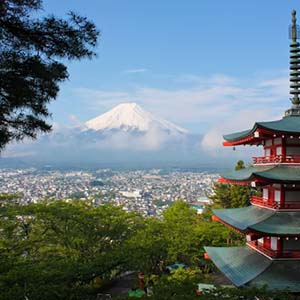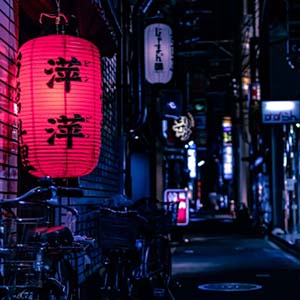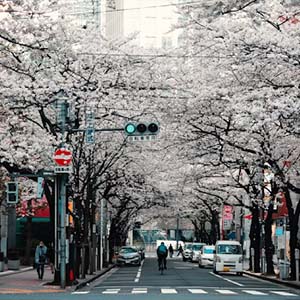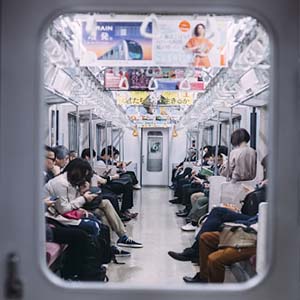Moving to Japan from the UK
Over 6.5 thousand miles from the UK, Japan observes a unique culture. The collection of volcanic islands has a fascinating history, and in their past saw over 200 years with no foreigners permitted inside, so entering the country can still feel like a whole new world. Fascinating landscapes, futuristic technology and excellent food are all features of this island nation.
It is one of the most densely populated countries in the world, however, the standard of living across the country is generally high. The 127 million citizens have a literacy rate of around 99% and the social welfare system covers most of the population for health, education and more, meaning that the population is one of the oldest in the world. While the large cultural obstacles and language barrier might pose challenges, the food, beauty, affordable cost of living and charm of life in Japan are enough to have already tempted around 2 million expats. When relocating for employment, employees will find that life at home and work can come as a shock from the United Kingdom.
Japan Orientation
More than 90% of Japan’s population resides in urban areas, usually large cities. Tokyo is located in the southeast of the island, near the East coast and beside the cities of Yokohama and Shizuoka. Kyoto and Osaka, both popular residential cities, lie further West of the capital. However, there are wide areas of the country that are not urbanised. In fact, around 70% of the country is characterised by mountains and forests.
Several climates are experienced within the country of Japan. In the north, there is considerable snowfall in bitter winters. At the southernmost points, the islands have more tropical temperatures. In most areas, summer is temperate, however, from mid-June to mid-July, it is the rainy season. Summer follows this period until September, with average temperatures of 30C. Autumn and winter are usually bright and sunny without the rainfall we are used to in the UK.

Learning the Language
Japanese is the official language of Japan, and the native population will speak this throughout the country. Compared to English, Japanese is a complex language full of nuance and formality. Japanese is also heavily influenced by body language and meaning can be conveyed through gesture rather than syntax. Native speakers typically do not expect foreigners to grasp it entirely, however, it is expected that as a sign of respect for your host country, you learn some basic phrases and vocabulary. Some examples are below:
- Hello (in person) – Koh-nee-chee-wah
- Good morning – Ohio go-zai-mahss
- How are you? – Oh chen-key dess kah?
- Thank you – Ah-ree-gah-tow go
Major cities will have schools that teach Japanese to foreigners. It is also possible to obtain Japanese lessons in return for giving English lessons. English is compulsory in Japanese schools however fluency and comprehension levels will vary from person to person so you should not expect to be understood everywhere. If working for a business in Japan, English may well be the language of operation, but this again shouldn’t be assumed.
Is it easy to move to Japan?
Yes, it is easy to move to Japan if you have secured the right visas before moving to the country. Employment is the most simple route into the country. The easiest visa to obtain is a work visa, but you must have been offered the job before moving. You will also be advised to get vaccinated for Japanese encephalitis, which is a disease that comes from Mosquito bites. If your Japan-based company is sorting your work visa then it should be a smooth immigration process.
Passports and Visas
Securing work permits and visas can be a difficult process. Visit our website to find out how our Visa and Immigration services can assist in your international relocation.
Passports: Whenever travelling abroad, every person present should carry a valid passport. Each passport should remain valid for longer than the length of the intended stay in the country.
Visas: A visa is also required for entering Japan from the UK. The visa you need will depend on the specific purpose and period of time of your visit or move to Japan. You should ensure that you procure the correct visa for the country, length of time and purpose of your trip. It could be a separate piece of paper, electronic or just stamped in your passport. Your employer might be able to assist you with the process so make sure to make the most of their support.
To research different types of visas for Japan, visit the Japanese Ministry of Foreign Affairs website or your local embassy or consulate. For the visa process, you will need several important documents, including birth certificates, bank statements and academic credentials, often translated.
Moving to Japan with Household Goods
When moving to Japan, personal items and household goods are not permitted to travel with you as baggage. Instead, your belongings should arrive in Japan within 6 months of your arrival. They will be exempt from taxes if they are shipped with the ‘Original Declaration for Unaccompanied Baggage’ form (C 5360-2). This form will require your name, Japanese address, and the number of cases as well as an insurance list.
It is also worth checking with your employer as there are sometimes restrictions on household shipments. This could affect your decision to bring large items such as furniture and appliances. Room sizes in Japan tend to be much smaller than in other European countries so it’s worth checking the size of your accommodation before packing your shipment. Storing excess belongings in Japan can be expensive so it’s best to source larger items locally.

Restricted and Prohibited Items
There are restrictions on the quantity of some items entering Japan. This includes appliances, household items under a year old, and video cassette tapes. To avoid issues, you should have a detailed list of any of these items on your invoice, and receipts are good for proving items are over a year old.
In addition, some items are not permitted to enter Japan, even in your household shipment. If any are found to be inside, they will be returned to your country of departure or abandoned. Japanese customs officials are vigilant and will detain or investigate those carrying any suspicious items. The following items are prohibited:
- All vegetables and plants with soil.
- All plant products, including fruit, straw, flour and more.
- Bones, horns, eggs, and any other parts of the following animals without an accompanying health certificate: cows, goats, sheep, horses, chickens, ducks, geese, turkeys, rabbits and bees.
- Any illegal drugs, narcotics or medications containing amphetamines.
- Lethal weapons of any kind.
- Pornographic or politically sensitive media.
- Counterfeit money/securities.
- Items infringing on Copyright or Patents.
- Some inhalers and allergy medication with trace amounts of amphetamines – travellers needing these medications must bring authorisation of their possession i.e. prescriptions.
Taking a pet to Japan
If you’re currently living in the United Kingdom with pets, you might be wondering what the process is like to bring your furry friends with you when relocating to Japan. If their vaccinations are in order, the process of importing pets is fairly easy. Information will be required, alongside the appropriate documents proving vaccinations from your local veterinarian, and it’s a good idea to get these documents translated into Japanese.
40 days before arrival in Japan, you’ll need to notify the country that your pet is due to arrive, at which point the Quarantine Service will review your documents and send confirmation of approval. Upon arrival, the Quarantine Department will again check your documentation. If all is in order, your pet should be released to you within a few hours, but errors may deem a quarantine period necessary. This can be up to 180 days, so attention to detail with your pet’s documentation is key.
Moving to Japan with your Vehicle
When deciding whether to move to Japan from the UK with your vehicle, you should check any restrictions on your household shipments. They often are restricted by employers by weight or volume or might exclude certain larger items.
Vehicles and boats must be imported with the correct registration papers which prove ownership for at least one year prior to their arrival in Japan. If you are moving to Japan on a temporary term, it is possible to import vehicles temporarily free of duty tax if they are re-exported from the country. For more information, contact your nearest Japanese consulate. New and used motor vehicles are available to be purchased in Japan. Prices may vary widely depending on make and model and you should always take care when purchasing a used car.
Driving conditions when living in Japan may also be a factor to consider when deciding to take your car. Congested city traffic and hectic conditions are common when driving in Japan, particularly in Tokyo. In addition, parking is difficult to find, and it is often required before you are permitted to purchase a vehicle locally. When moving to Japan from the UK, fuel prices will be comparable to prices in the EU and UK. Some expats require a work vehicle, but others can use public transport or bicycles, so your transport requirements will dictate what option you choose.

Finances in Japan
As a major financial centre in the world, there is no shortage of choices for banking services. A range of services is offered by not only city banks but also regional banks, savings and loan banks, credit associations and postal saving systems. In large urban and metropolitan areas, it is increasingly common to see international banks that offer services like those offered in home countries. Like in the UK, banks in Japan are open from 9 am until 3 pm on weekdays and closed on weekends and bank holidays. ATMs are found inside banks.
Japanese banks typically have different tellers for different functions and a uniformed employee will provide assistance in the lobby. Japanese banks in the city of Tokyo will have a few English-speaking staff members to assist you.
To receive salary payments and to pay monthly bills, it may be necessary to open a bank with a local Japanese bank. There are three main types of bank accounts offered by Japanese banks: General deposit accounts (futsu yokin), long–term deposit accounts and checking accounts. A general deposit account will require a residence card, another form of identification, proof of address and a minimum deposit. If you are successful in acquiring a hanko, or personal seal, this could streamline the process of opening a bank account as well as many other bureaucratic tasks in Japan.
Currency and Exchange
When living in Japan, you will be using the Japanese currency of yen (¥), one of the most widely traded currencies internationally. There are paper banknotes of the denominations ¥1000, ¥2000, ¥5000 and ¥10,000 with each a different size and colour. Money is easily exchanged throughout Japan. There are currency exchange services at airports, banks, kiosks, hotels, and department stores. The best exchange rates are likely found in international airports in Japan.
Finding housing in Japan
Finding accommodation when you are moving to Japan from the UK can be difficult, particularly if you have not grasped the local language yet. If you do not speak Japanese, it is advisable to bring somebody with you who does: This will avoid any misunderstandings and make the whole process a lot easier. Useful phrases include Shiki-kin (refundable deposit), Moshikomi Shokokin (Temporary booking fee), and Tetsuke-kin (Initial deposit). Additional interpretation services and assurance of a fair lease agreement can be provided by realtors and relocation services.
Realtors: Housing in Japan is commonly rented through realtors or real estate agents so they will have the listings and the experience to help you. They are a great resource, not only for finding the right neighbourhood for you but also for getting reasonable terms on your lease while vouching for expatriates’ suitability as tenants.
Relocation Services: Relocation agencies, like realtors, can be very useful when you are looking for housing in Japan. These agencies also offer many additional services to ease your relocation, such as offering customs and language training, spousal employment assistance and school searches.
Read about the Relocation Services offered by Gerson Relocation and how we can ease your international relocation.
Other services: Aside from formal services and agencies, you will also be able to find homes advertised in other ways. Magazines and local expatriates are both good resources for finding local housing opportunities.
To buy or rent in Japan
Housing in Japan is some of the most expensive in the world. Most expatriates and foreigners to the country tend to rent housing when living in Japan. It is best to use the help of a realtor or relocation agency as there is no Multiple Listing Service designed for tenants to use. As rental contracts generally last for 2 years, many people choose temporary housing instead.
Rental Agreements: After finding a suitable property for you and your family, you will enter a rental contract, which normally lasts for 2 years. The minimum stay is around 2 months, and a corporate or Japanese Personal guarantor is typically required. Upon renewal of your lease, fees, which are paid monthly in Japan, may rise. 1-2 months’ notice is generally required for the termination of your lease. If renting in a communal area, a maintenance fee may be charged to cover the upkeep of communal property. Rental fees typically cover all utilities, maintenance, furniture, cookware, and soft furnishings.
Leases are written in Japanese so if you are to sign the contract you should ensure it is translated into English so that you understand everything. It is common for a corporation or guarantor to sign the lease, so if you work for a company this is also an option.

Types of housing in Japan
Cities like Tokyo offer a range of unfurnished apartments and houses, however, furnished accommodation is more difficult to find. Most expats living in Japan live in apartments. Japanese dwellings are typically smaller than many foreigners are used to, with limited closet space and small kitchens. If your accommodation does have a garden or yard, it will likely be very small. There is Western-style housing in Japan, built in a combination of Japanese and Euro-American styles. This more modern housing will be fully equipped with kitchen appliances and central heating.
Apartments: Apartment buildings (apaarto) can range from small two-story wooden buildings to comfortable Western-style apartment houses. Apartments are normally described in terms of ‘LDK’. The number preceding LDK will indicate how many rooms in addition to the main combined living, dining and kitchen area, normally bedrooms. Space is often indicated in terms of square metres, but tatami is also a measurement that is used – 1 tatami is 90 cm wide, and 180 cm long.
Houses: Houses in Japan are built to maximise ventilation, meaning they are light and airy. Insulation is not common, so street noise and weather are not kept out. To keep warm, space heaters are normally used. Houses in central cities like Tokyo rarely have outside space.
Housing areas in Japan
Most expats, like the native population, live in urban areas in Japan. Cities are a hub of business and people so these are most likely to attract foreigners. The following are some popular areas to live among expatriates:
Kansai: Kansai includes Kobe, Kyoto and Osaka and is located around 300 miles southwest of Tokyo. There is a close-knit foreign community in this area, making it popular for foreign business people and their families. Life is slower–paced here and getting around is much easier than in Tokyo. Rental prices also tend to be cheaper.
Nagoya: There are many neighbourhoods in Nagoya that are popular amongst expatriates and also offer the newer Western-style housing. Housing in Nagoya is around 30% cheaper than in Tokyo and transport connections are good.
Tokyo: There are a variety of suburban areas in Tokyo that offer great services, transport links and resources for English speakers. Areas that are within the circle of the Yamanote train line are extremely popular with expatriates and therefore the rents are higher.
Getting around in Japan
Getting around in the UK compared to Japan is quite a different experience. There are both personal transport options and great public transport connections, if in Japan’s large cities. Consider the following areas carefully before making a decision about what your plans should be.
Driving conditions in Japan
Driving in Japanese cities can be complex and confusing for those not used to city driving. Vehicles are desired by some expats for work or vacations, however, streets can be narrow and larger vehicles may have difficulty. Parking is limited and expensive in large cities and is often required before you purchase a car locally in Japan. It’s also possible to rent a car with a driver if a vehicle is only required occasionally and taxis are plentiful but expensive in Japanese cities.
Driving License
It is illegal to drive in Japan on your home licence alone, so you must either procure an International Driving Permit or a Japanese licence. You can obtain an IDP in your home country before you travel.
If you are relocating to Japan for longer than 12 months, it is a good idea to apply for a Japanese licence. The process of converting your licence is detailed by Lease Japan. You can do this with a valid home licence held longer than 3 months at your nearest licence office shortly after arrival. Other documentation required includes:
- Original passport and copy
- Residence card and copies of both sides
- Passport photo
- Copies of your home licence
- A Japanese translation of your licence
After applying, you must take an eye exam, colour blindness test, hearing test, written and road tests – if you have a UK licence, you will be exempt from the written and road tests. More information is available on the Metropolitan Police Department website.
Vehicle Insurance
In Japan, it is compulsory to procure automobile liability insurance (CALI). This is necessary to register your vehicle and you must then always carry your policy in your car. It is recommended to get additional coverage for other property damage as the compulsory insurance only covers physical injury.

Public Transport
Japan has one of the best-developed and most efficient public transport systems in the world. Though extremely convenient, lines are often crowded and pushing and shoving are common at their busiest. Systems generally operate from 5 am until midnight with services running every 2 to 10 minutes.
You can purchase transport tickets from machines. You can select the language to be English on the initial screen. Machines will take cash and there are also prepaid cards and day/weekly passes available. Fares are calculated on distance of travel- you can buy the minimum-fare ticket and pay the balance to the ticket-taker when you leave the exit station. The Japan Rail Pass is a good option for foreign travellers looking to sight-see in Japan. There are different lengths of pass that are valid on ferries, buses, and railway lines.
Buses: Local buses can be difficult for foreigners to use. There are complicated routes, traffic is common and all signs are written in Japanese.
Subways and Trains: The subway in Japan is safe, clean, and convenient to use. Subway and rail is the fastest way to get around the major cities including Tokyo, Osaka, Kyoto, Nagoya and more. Station names are printed both in Japanese kanji and in the Roman alphabet and there is English signage at stations. During rush hour trains can become seriously overcrowded so commuters should be aware of this. Passengers will be passive and avoid eye contact, so this is accepted practice.
Expat Life in Japan
Expatriates from all over the world have settled in Japan. There are currently 1.9 million foreign nationals from Korea, China, Brazil, Peru and more. Tokyo is the most popular destination for foreigners moving to Japan. In Japanese history, they have been strongly against foreigners entering the country and experiencing their unique culture. Older Japanese people have a strong sense of their cultural uniqueness and superiority, and they regard foreigners as “not part of us”.
Expatriates tend to socialise with one another through social organisations, clubs, and school functions. These will provide ample opportunity to build relationships. It is also possible to become friendly with Japanese business associates, especially younger generations.
Adjusting to unique Japanese culture takes time, both in business and everyday life in Japan. Your new colleagues and your company’s office can help in many ways so make sure to use these resources. There are several non-profit communities in major cities that provide a warm welcome to new foreign residents. It is possible to contact them for a visit from an English-speaking representative.
Social Life
As already mentioned, the social life for expats in Japan often revolves around other expats, but there are opportunities to socialise with the native population too. A good way to make friends and encourage home visits is to create a calling card or ‘meishi’. These cards include the husband‘s, wife’s and children’s names, address, telephone number and a detailed map of the address.

Religious Worship
Many religious services are offered in English in some areas of Japan, including Roman Catholic churches, Baptist, Anglican, Jewish and Islamic services. Foreigners in Japan may also find cultural and social service activities run for the foreign community.
For more information on appropriate religious services for you and your family local to you, refer to expatriate newspapers or contact your embassy or consulate.
Social Customs
As Japan has a unique culture steeped in history, its social customs and what is considered polite are based on an archaic system of respect. Foreigners are expected to follow social customs out of respect for their host country. If people are displeased with your actions, you will be notified in a way that avoids conflict in any way.
Cross-cultural training can be key to your personal and business success in Japan. View our Cultural Training services as part of our International Relocation Services.
Greetings and terms of address
When meeting people in Japan, you could be greeted either with a handshake or a traditional Japanese bow. You should not attempt to do both. Handshakes are loose and you should bow with the same depth that your counterpart does. Individuals who hold higher ranks earn longer bows than those who are lower in rank. When living in Japan for an extended amount of time you should look more into the etiquette of bowing.
The Japanese follow a formal system of address meaning that first names are only appropriate when addressing children and adolescents. When addressing anyone else, use their last name followed by ‘san’, using titles if you know them. Do not use first names and you should not suggest that others call you by your first name. You also shouldn’t use ‘san’ in reference to yourself.

Gestures and body language in Japan
As the Japanese language is filled with subtleties and nuanced meaning, body language and tone are big conveyors of meaning. Some physical gestures to be aware of are the following:
- Sitting with legs crossed with one foot pointing at someone is considered impolite by many.
- Folding arms during conversation indicates thinking.
- The Japanese tend not to touch other people in social situations.
- Putting your hands in your pockets may indicate laziness.
- Japanese people often point to their noses to indicate themselves.
- Closed eyes can indicate concentration, particularly in business contexts.
Alcohol and Drinking
Among Asian countries, the Japanese consume one of the highest amounts of alcohol. Beer is a popular beverage as is Sake, Japanese rice wine. Getting drunk is not seen as disgraceful however it is frowned upon in more formal restaurants. In business contexts, alcohol encourages social inhibitions to be broken and more boisterous and assertive conversations can occur. Foreign businesspeople should recognise that they are not expected to match the Japanese when drinking.
At a social event, it is customary to wait until everyone at the table has been served and a toast is raised. You should also serve others drinks or be served by others rather than helping yourself.
Etiquette in Japan
A strong element of Japanese culture is Confucianism, which emphasises harmony in relationships, respect for rank, authority, and age. The Japanese believe that relationships are important and that we can only find peace by tending to the needs of others before our own. You should avoid giving criticism as it is found impolite and disruptive, and problems and concerns are raised with minimal confrontation.
Dining comes with its own set of points that you should follow when living in Japan. Some are listed here:
- Don’t pierce food with chopsticks.
- Use the blunt end of a chopstick to serve yourself from a communal dish.
- When not in use, chopsticks should be placed on their rest.
- Wait until everyone is ready to eat before beginning.
- Do not mix your rice with other foods.
- Slurping noises indicate you are enjoying the meal.
Tipping Etiquette
It is not customary in Japan to tip. It is assumed that a customer’s money is going towards an exceptional service and therefore additional incentive is not necessary. If you attempt to tip in certain situations, it can cause confusion and sometimes offence. A service charge of 10-20 cents is added in restaurants, hotels, and ryokan. Foreign businesses in Japan serving foreigners may have a way to tip employees.
Interested in information on another country? Take a look at our other International Relocation guides.
Great Customer Experiences start here
Very pleasent and helpful. Nothing too much trouble.
Mr M H moved from London, UK to Toronto, Canada
Very helpful and patient even when things got packed that we had to get out again!
Mr M E moved from Enfield, UK to Dorset, UK
Thanks to Graham, Nick and the entire crew!
Mr C D M moved from UK to Singapore
Friendly and helpful crew.
Ms T W moved from USA to Cambridgeshire, UK
